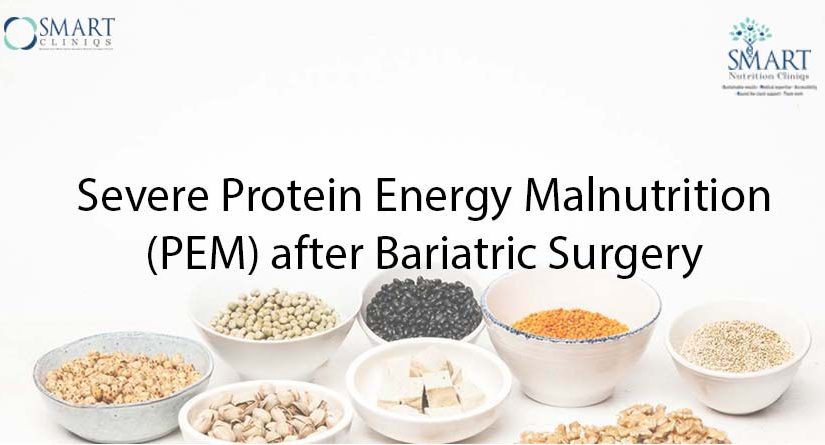Protein is a Macro – nutrient and building blocks of body tissues. It also serve as a fuel source, 1gm gives 4 Kcal. Protein is needed for growth and maintenance and can be found in all body cells (Total body protein= 50% in muscles + 20% in bones + 10% in skin + rest in other parts).
The term “Protein” comes from the Greek word ‘protos’ – to take first place!! The same implies to its intake after bariatric surgery. Bariatric patients are advised to feed themselves with protein first to fulfil their protein needs as well as for a healthy weight loss.
After weight loss surgery patients can be at risk of PEM due to Inadequate protein and/or energy intake, food intolerances to good quality protein, restrictive/malabsorptive surgeries (reduced Length of gut hence less area available for absorption, Pancreatic), small stomach pouch, increased protein need for wound healing, food aversions or food faddism, poor compliance or ignorance of post-surgical nutrition guidelines and/or Inability to recognize or afford high quality protein.
Various sources of protein are available which can be included in the diet such as Pulses and legumes and Nuts, Eggs and poultry, Fish, Milk & Milk Products and as supplements in different forms like Whey protein isolates, Whey protein concentrates, Soy protein and Pea protein to fulfil protein needs. WHEY PROTEIN ISOLATE is best suitable for bariatric surgery patients as this provides PDCAAS of 1.0, supplies 90% pure protein and is easily digested and absorbed.
Protein requirements after bariatric surgery are 1–1.5 g/kg IBW to maintain Fat Free Mass during weight loss, whereas the normal RDA for Indian males and females is 1 g/kg body weight. In case of Malabsorptive procedures it should be 1.5–2 g/kg IBW. Protein provided should be of High Biological Value and is easily digested and absorbed.
PEM after bariatric surgery can be assessed by ABCD approach, where ‘A’ stands for ANTHROPOMETRIC (Muscle mass and fat free mass), ‘B’- BIOCHEMICAL (Total proteins, Albumin and Globulin), ‘C’- CLINICAL signs & symptoms and ‘D’- DIETARY RECALL. Clinical signs of PEM are generalized weakness, excessive hair loss, poor wound healing, loss of lean body mass and anaemia.
Based on blood protein levels PEM can be classified as:
| Stages of PEM | Serum Albumin levels (g/dl) |
| Mild | 3.0 to 3.5 |
| Moderate | 2.5 to 3.0 |
| Severe | <2.5 |
PEM is generally observed at 3 to 6 months after surgery. Vomiting, diarrhoea, depression, and alcohol consumption, may also lead to/ or exacerbate this condition.
For Mild to Moderate PEM Oral feeding with high protein diet (1.5 to 2gm/kg IBW) and protein rich supplements, esp. short chain whey protein isolates is recommended.
For Severe PEM admission to the hospital is required and patients are managed with enteral feeding/Albumin infusion/Total Parental Nutrition/ Restoring the anatomy/ Feeding gastrostomy/ileostomy in select few cases is required.
To prevent PEM, pre-operative routine screening (laboratory measures of visceral proteins) is important to assess the risk of protein malnutrition. Post-operatively monitoring of serum albumin concentration (remains in the normal range until late) and/or Lean body mass. Close monitoring for any clinical signs and symptoms. Helping patients fulfil protein needs & identify high-quality protein foods and supplements (rich in leucine). Regular assessment of protein intake is critical. Patients are advised to include and choose protein first in all meals especially at breakfast to relieve the catabolic state of overnight fasting. Continued multidisciplinary efforts are important to establish best practice for protein intake.






